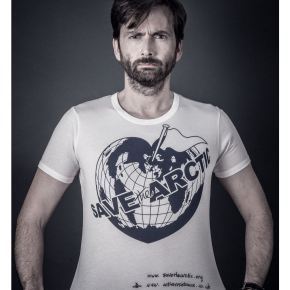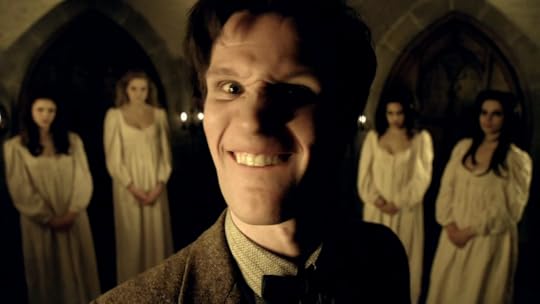Christian Cawley's Blog, page 84
July 24, 2015
Tales From the Red Planet: A Red Wolf
James Lomond is a writer at Kasterborous Doctor Who News and Reviews - All the latest Doctor Who news and reviews with our weekly podKast, features and interviews, and a long-running forum.
Isslar rasped air in and out as he hurriedly closed the pod door and turned on its engines. Moments later he was speeding through the half empty canals of Mars’s grandest capital, crumbling buildings and empty hatcheries flashing past. His claws were trembling. Every now and then he would glance back at the greasy, blood-stained bundle in the corner.
Mars was dying and only the military had anything to offer a young male entering his fifth cycle. There were no other positions left except the one remaining farm where the workers spent most of their time defending it from looters. Otherwise there were the Pyramid death cults. Isslar had no interest in religion.
Images replayed in his mind. The argument with their parent elders. Watching his brother take the blessing. Following him to the shedding grounds – watching him lie still and slowly ease out of his old skin. Standing over his brother as he lay prone in soft new adult flesh. His brother lying in a pool of blood. Isslar gathering up the old skin. And running.
His brother had been chosen for off-world service as a Warrior Lord. He would command a squadron of the Grand Marshall’s fleet. Mars was dying from starvation and the blue planet was to be their new home. It was covered in water but it steamed into white vapours from the closeness of Sol. It would be made habitable and the vermin occupying that hot, wet world would be crushed. This was what Mars needed – a conquest. And Isslar hated his brother for being chosen.
His canal pod was nearing the Space Dome where pilots were trained and conquests planned. His brother was to be initiated into his biomechanical shell. There were few honours that great. And after growing through every cycle in his brother’s shadow, Isslar would finally get what he deserved.
The Warrior suits were tailored to their wearer’s physiology. They made you taller, stronger. When first worn in the initiation ceremony they could only be used by the intended person – genetic recognition patches lined the inside and sampled the occupant’s skin. The shell infuses the body with stimulants and hormones. Neural relays sharpen senses and quicken reflexes. A shell is honour. A shell is power.
Their elders had set so much by age, his brother always coming first. They had even named them Slaar, ‘first’ and Isslar, ‘second’ as if to remind him constantly of his place. But in a few hours everything would change. And his entire hatchery would be proud when he led the fleet to victory.
He was nearing the dome where officials would be preparing the initiation. He smiled, drawing oily green lips back over sharp teeth. He could taste blood from where his brother clawed his mouth in the brief struggle and on the horizon he could make out the blue planet in the red haze. He glanced again at the bundle behind him. Isslar knew the ritual.
And now he had his brother’s skin.
The post Tales From the Red Planet: A Red Wolf appeared first on Kasterborous Doctor Who News and Reviews.
Peter Capaldi Talks to Doctor Who: The Fan Show
Christian Cawley is a writer at Kasterborous Doctor Who News and Reviews - All the latest Doctor Who news and reviews with our weekly podKast, features and interviews, and a long-running forum.
Doctor Who star Peter Capaldi chatted with Doctor Who: The Fan Show‘s Christel Dee at the San Diego Comic-Con earlier this month, which you can watch in this latest installment of the DW:TFS.
It’s quirky, it’s fun, but this latest Doctor Who: The Fan Show really promises to be the best yet, finally speaking to the star of the show, the guy everyone wants to spend time with. To be honest, we’re slightly surprised it has taken this long to feature Capaldi on DW:TFS, but there you go.
You can view previous episodes here on Kasterborous, but you should probably also subscribe to Doctor Who: The Fan Show on YouTube to get the latest updates as they’re released.
The post Peter Capaldi Talks to Doctor Who: The Fan Show appeared first on Kasterborous Doctor Who News and Reviews.
60m Overseas Viewers Enjoy BBC for Free as Moffat Defends Corporation
Christian Cawley is a writer at Kasterborous Doctor Who News and Reviews - All the latest Doctor Who news and reviews with our weekly podKast, features and interviews, and a long-running forum.
The Conservative government’s green paper investigating the current structure and performance of the BBC will propose changes that will more than likely be imposed. As a result, many supporters of the BBC have spoken out in support of the organization, despite having no genuine idea what proposals will be made.
Among them is Steven Moffat, who has spoken recently to The Stage. As well as being one of the many industry people to put their names to an open letter backing the corporation, Moffat has made an impassioned support of the BBC.
“If we limit it, or damage it, or destroy it, we have absolutely no idea how to turn [the BBC] back on, because we don’t know how it happened it the first place… You could look at [the BBC’s] philosophy, you could look at the fact that somehow from the work of those early pioneers it became a beacon of quality – not just for Britain, but for the entire world.”
He goes on, pointing the finger at the goverment:
“If we allow, basically, the Tories to turn off the people that are criticising them, which is what is happening, I can’t see how we’d get it back.”
(It might be argued, of course, that the BBC has already had its critical teeth pulled; there are many who feel that ever since the September Dossier affair in the run up to the Iraq invasion, the BBC has generally failed to hold governments since to account.)
Many have criticised those backing the BBC for doing so out of loyality to their employers. But is it really a “pathetic argument”?
“The inevitable, pathetic argument against this is that we’re all feathering our own nests because we’re all employed by the BBC – but they don’t pay that well.”
Despite Moffat rightly claiming that “I could have made more money if I’d stayed with my Spielberg three-picture deal, and not done Doctor Who,” the fact remains that any financial interest is going to result in loyalty that might blind someone to the weaknesses of their employer. It’s probably reasonable to dismiss both sides of this argument, but I suspect we’ll be hearing various twists on it until the green paper is published (and beyond)…
But here’s the flip side. Should British license fee payers be supporting a broadcaster whose BBC iPlayer service is being enjoyed absolutely free by an estimated 60 million people worldwide who are using VPN technology to hide their online location (and we’re not talking about Netflix and Hulu viewers here)? Figures suggest half of this figure is from China alone, but that still leaves 30 million people enjoying Top Gear, Sherlock, Doctor Who, EastEnders and more without contributing a single penny to their production.
Bearing in mind that the last UK census recorded a population of 63 million, is it perhaps time that the BBC changed its payment model to ensure that it is gathering income from these overseas viewers as well as those at home? Only 25,460,801 colour TV licenses were recorded in 2014 (with a further 4.7 million licenses for the elderly). Again, the degree to which unauthorised, overseas viewers are taking advantage of the BBC’s output is staggering.
A BBC spokesman said:
“BBC iPlayer, and the content on it, is paid for by UK licence fee payers to watch and download in the UK and the terms of use reflect that.
“We do not comment on individual cases regarding breaches of BBC iPlayer’s terms of use, but we take steps where appropriate to protect the intellectual property belonging to rights holders.”
Could it be time for BBC iPlayer to head online as a premium multiplatform app, like Netflix and Hulu? And could the resulting income result in a lower license fee, or an increased quality of production on our favourite TV shows? Should the British public be forced to pay for what is now, essentially to all intents and purposes, a global on-demand TV network?
What do you think?
The post 60m Overseas Viewers Enjoy BBC for Free as Moffat Defends Corporation appeared first on Kasterborous Doctor Who News and Reviews.
Doctor Who Stars Save the Arctic in Exhibition: Closes Sunday!
David Power is a writer at Kasterborous Doctor Who News and Reviews - All the latest Doctor Who news and reviews with our weekly podKast, features and interviews, and a long-running forum.
Earlier this month the London Underground’s Waterloo Station became host to Greenpeace’s latest exhibition for the Save the Arctic campaign. The exhibition features photos of a plethora of celebrities donning Vivienne Westwood’s Save the Arctic t-shirt. The photos are plastered over the station’s entire advertising space, mainly along escalators leading up to the oil company Shell’s London HQ who have just received the go-ahead to begin their Arctic drilling.
Many Doctor Who stars of the past, present, and future participated in the campaign, including three Doctors!









When asked about why he supported the campaign, Peter Capaldi stated:
“We know this planet is a fragile one. Yet we stand and watch as the Arctic shrinks. We watch the home of Polar bears and whales and walruses disappear before our eyes. The time has come to stop watching. We must act.”
War Doctor actor John Hurt also said:
“The Arctic is one of the last great pristine ecosystems, a safe haven for endangered species and home to Indigenous Peoples whose lifestyle has survived in harmony with nature for thousands of years. This is now all under threat. It’s time to act.”
John Sauven, Greenpeace UK’s Executive Director explained:
“Behind the 60 famous faces in this collection, there are millions more rising up to demand Arctic protection. The global movement to defend the Arctic is snowballing – with seven million people already calling for its protection.”
The exhibition is running until the 26th of July (this Sunday).
The post Doctor Who Stars Save the Arctic in Exhibition: Closes Sunday! appeared first on Kasterborous Doctor Who News and Reviews.
July 23, 2015
Out Now: Short Trips – Dark Convoy
Philip Bates is a writer at Kasterborous Doctor Who News and Reviews - All the latest Doctor Who news and reviews with our weekly podKast, features and interviews, and a long-running forum.
The latest release in Big Finish’s long-running Short Trips range has just been released and sees the Seventh Doctor and Ace in the middle of the Second World War.
Dark Convoy is written by Mark B. Oliver and narrated by Sophie Aldred (Ace), and this is what it’s all about:
Materialising aboard the corvette HMS Thunder during the Second World War, the Doctor and Ace join Commander Fitzgerald and his crew as they track an allied submarine in trouble.
While the Doctor advises the Captain on navigational matters, Ace joins in a daring mission to rescue sailors in the water. With German planes overhead, no-one’s survival is guaranteed…
It’s directed by Lisa Bowerman, best-known as Bernice Summerfield, who has been in many audios with Sylvester McCoy and Sophie Aldred, and appeared in Survival (1989) with them too.
This is the seventh release in this fifth series of Short Trips: next month, it’s the Eighth Doctor’s turn, in Foreshadowing, read by India Fisher.
Dark Convoy is an exclusive download from Big Finish, priced just £2.99.
The post Out Now: Short Trips – Dark Convoy appeared first on Kasterborous Doctor Who News and Reviews.
Retrospective: BBC Books’ The Banquo Legacy
Simon Danes is a writer at Kasterborous Doctor Who News and Reviews - All the latest Doctor Who news and reviews with our weekly podKast, features and interviews, and a long-running forum.
My great claim to fame is my connection to Justin Richards.
Back in 1980, I co-edited a fanzine called Fendahl. We once ran a charity raffle; John Nathan-Turner generously sent us a box of stuff that had been used on TV, including Tyssan’s nylon rope: as you watch the story, you will see Tim Barlow carrying said item in Destiny of the Daleks. This marvellous and highly prized artefact was won by none other than Justin Richards. Thus I claim celebrity and recognition that shall never die.
Justin Richards is also one of the best of the Doctor Who spin-off novelists; he doesn’t disappoint here, either, where he’s joined by Andy Lane (another good spin-off Who writer) as co-author. The book’s narrated in the first person by two witnesses to the events: Inspector Ian Stratford, and John Hopkinson. (One assumes Justin wrote one, and Andy wrote the other.) Narrative devices like this can be pretentious and can go badly wrong; there’s always the danger of the ‘look at me, aren’t I clever?’ syndrome, which irritates intensely and gets in the way of just telling the story. When it’s done well, it’s very effective, and it’s similarly very effective here. First person narratives are great ‘pulls’ into the world of the story (one of the reasons why Doctor Who and the Daleks is probably the best of the TV novelisations). The original novel of Dracula is told by multiple narrators; the period and tone is similar to Banquo Manor, so it’s a possible influence. And the narrators are believable people, well characterised and with their own distinctive voices.
And it’s another belter of a novel. Except…
I don’t like Compassion. No, I don’t mean I don’t like compassion. I don’t like Compassion. (This is a most amusing joke that has never been used before. Read on and you’ll comprehend my burblings.)
A running theme of the Eighth Doctor novels is that something’s gone badly wrong with the TARDIS and it becomes unusable: lost, blown up, or generally utterly knackered for various tedious reasons. For quite a few of them, the Doctor has a replacement TARDIS – and she’s sentient, she’s called Compassion, she looks human, and she acts as a companion in her own right.

I never really felt this concept worked. Taking the proper TARDIS away from the Doctor is like taking Morecambe away from Wise, or Laurel from Hardy. They’re a double act and they have to be together. Nor does it feel right if the TARDIS looks like Nicole Kidman rather than a police box (one of the books – I forget which – said she looks like that, and that’s a bit silly, really).
The other problem is that Compassion’s a fairly unlikeable character. While this does produce some dramatic exchanges, as her morality’s far from that of the Doctor’s, it makes it hard to sympathise with her. It’s hard to care what happens to characters who you don’t like. Compassion’s spiky, selfish, and unpleasant. Idris, she ain’t. And you keep wanting the proper TARDIS back, not some snide, sexy substitute.
That said, the presence of Compassion in the novel is its only real drawback. And there’s always the splendid Fitz Kreiner to compensate: a well-meaning, slightly dodgy, grungy chap who combines incompetence with genuine warmth. (And someone who, unlike Compassion, would work well on TV.) Much of the book’s humour – and it’s genuinely funny, too – comes from him. He and the Doctor pose as scientific investigators, under the names of Doctor Friedlander and Herr Kreiner. (Fitz is half German, you see.)
The Doctor and Fitz land on Earth in 1898. Compassion’s chameleon circuit makes her meld with Susan Seymour, a guest at Banquo Manor. (Aha! The clue’s in the name. Banquo was murdered by Macbeth’s henchmen and his ghost causes a bit of a social embarrassment when it turns up at the Macbeths’ banquet. Expect something nasty to happen in the book, then.) The melding’s not a bad idea; it provides some good moments when the dual personality switches between Compassion and Susan, making her alternatively bitchy and then nice – but surely invading someone’s body without their consent, as Compassion does, is a violation? I’d be bloody annoyed if someone jumped inside my head without asking.
It’s a bit odd that neither the Doctor nor Fitz draw attention to this. But never mind, because there are exciting and nasty things going on. Susan’s fiancé is an obsessive scientist called Richard Harries, the owner of the Manor, who’s experimenting with telepathy. Never a good idea. It releases dark forces among the guests who’ve gathered to witness his experiments, and they’re stalked by some deeply vicious beings.
The enclosed setting gives you a variant of the ‘base under siege’ story; the Manor’s effectively cut off from civilisation by heavy snow, and there’s no possibility of help from outside. And there’s a mysterious butler whose pantry seems to be bigger on the inside than you’d expect it to be…
I don’t want to give too much away about the plot, because that would spoil it when you read it. Enough to say that The Banquo Legacy is a real page-turner: well-written, involving, and with a strong story. (And, I fear, a considerably stronger story than many from the first televised Capaldi series. The production team might do well to look at the novels for more tales which deserve the Human Nature treatment. Controversial? Me?)
Highly recommended. Dust down your copy or grab one from eBay or Amazon. Take it to the beach this summer. You’ll enjoy it much more than booze, sand or sea.
Yes, you will.
The post Retrospective: BBC Books’ The Banquo Legacy appeared first on Kasterborous Doctor Who News and Reviews.
NuWho 10th Anniversary: What Is Your Favourite Series 5 Story?
Philip Bates is a writer at Kasterborous Doctor Who News and Reviews - All the latest Doctor Who news and reviews with our weekly podKast, features and interviews, and a long-running forum.
This year, Doctor Who has been back on our screen ten whole years. It feels like yesterday that the TARDIS materialised once more; suitably, it also feels like forever.
So join us as we celebrate a decade with the Ninth, Tenth, Eleventh, and Twelfth Doctors. Let’s find out which serials are our favourites, and shine a light on the underrated ones too. Watch us run.
And then vote on your favourites. At the end of the year, we’ll find out which serials showcase our beloved show at the height of its game.
The Eleventh Doctor is here, running across time and space, being daft and fixing things. But the universe is cracked, the Pandorica will open, and Silence will fall. Joined by Amy Pond and Rory Williams, they face sexy fish vampires, Silurians, Weeping Angels, Daleks, and, uhm… old people who aren’t just old people. They’re very old people. All of time and space; anything that every happened or every will… Where do you want to start?
Philip Bates: The Pandorica Opens/ The Big Bang

I’m making no secret of this: to me, Series 5 is the best series of Doctor Who ever. You’d think that would make ‘favourite story of your favourite series’ extremely difficult. Not so. Fortunately, my favourite Doctor Who of all time occupies a vital place at the end of this run.
The Pandorica Opens/ The Big Bang was the sum of the whole series, making it the ideal finale and a thrilling reminder of past glories. There’s a magic underpinning the show, and even in the darkest hour, an optimism that perfectly captures who the Doctor should always be. And there are so many wonderful ideas, and joyous surprises that put the audience on the back foot: the alliance shoving the Doctor in the Pandorica; Amy being shot; Amy turning up in the Pandorica in The Big Bang; and that wonderful feeling of having Rory back – terribly heightened by the realisation that Amy doesn’t know who he is. The dialogue and plot are superb. So is the direction. And of course all the performances.
Frankly, an explanation of why it’s so fantastic doesn’t do it justice at all.
But that’s not what I want to talk about. Instead, I’m spotlighting the three moments that never fail to make all the hairs on my arms stand on end, something very few serials can do. First is the speech. You know it. We all know it. Matt Smith never ceases to amaze; how he infuses each line with something new, something refreshing, something unexpected. “Now my Doctor,” River promised in Silence in the Library, “I’ve seen whole armies turn and run away.” This could apply to The Pandorica Opens just as much as A Good Man Goes To War. My Doctor is that good.
Then the final scenes of The Pandorica Opens: the Doctor is dragged into the Pandorica, Rory has just shot Amy, unable to stop his programming kicking in, and River is inside the TARDIS as it erupts into flame. Murray Gold gives us The Life and Death of Amy Pond, genuinely one of the most beautiful and affecting pieces of music I’ve ever heard. It brings tears to the eye. The Doctor screaming for them all to listen to him, while the universe around him ends, sends chills down my spine.
Finally, to saying goodbye. This was the first time the whole TARDIS team stayed on for a series end, and it remains exciting. River saunters off into the sunset, promising mystery and endless adventure, while the Doctor, Amy Pond, and Rory Williams disappear from 26th June 2010. Vworp! Vworp! Next stop: everywhere.
Katie Gribble: The Time of Angels/ Flesh and Stone

This story has been a favourite of mine since it aired and is, I think, one of Matt’s best performances as the Eleventh Doctor. By this point in the series, we’re over the regeneration with the new Doctor finding his feet and now the Doctor has a sure footing and is starting to run.
It is the Eleventh Doctor’s first interaction with the terrifying Weeping Angels which makes this episode so memorable. I remember there being a lot of hype at the time for what was to be only the second time out for the Angels. However, I still think that this is the best story to include the stone clad sprites. Don’t get me wrong, Blink is a cracking episode but I think people put too much on it. For one thing the Doctor isn’t really in it, so this two part epic is the first time we have him actually come up against the Weeping Angels on screen.
As the Angels became more and more popular and used so frequently, I found that their use actually made them less terrifying. In this story, little is known about the Angels and the possibilities for Moffat to play with viewer uncertainty are at their peak. The Angels are still malicious with the tempting of Christian, Angelo and Bob into the darkness showing their cunning and delight in toying with the inquisitive humans. However, when Angel Bob reveals that the Angels want the Doctor and company to know that he died in pain and fear, that the Doctor made him trust and then let him down, the tables turn and the story places the Doctor on a war path.
This war path, fighting the Angels and refusing to let another man die, is rudely called to an end in Flesh and Stone. The death of Father Octavian is one of the most moving of Series 5. As soon as the Angel has its arm around Octavian’s neck, we all know his fate. It’s seeing the Doctors reaction and the tears welling in his eyes as he knows that by averting his gaze, Octavian will die. Responsibility weighs on the Doctor’s shoulders throughout but it is this scene which shows the impact on a man who has still only just started running. This scene holds so much in balance not just for the rest of the series, or even of Matt’s tenure as the Doctor, but it shows the burden which the Doctor hides most of the time. We get to glimpse, just for a moment, the reality of what life gallivanting through time and space has on the Doctor.
Jeremy Remy: Vincent and the Doctor

There are moments in Doctor Who, where the series becomes something greater than itself. Vincent and the Doctor is an episode which is more than a science fiction story—it is an examination of the invisible monster that is depression, with commentary on the importance and virtue of each individual’s life.
Tony Curran is brilliant as Vincent van Gogh, embodying the intensity and pain that defined the artist’s life. Bill Nighy frames the legacy of van Gogh with an impassioned adoration that steals the show whenever he appears on screen. And (in a rare occurrence) the Doctor and Amy don’t save everyone. The crack in time is briefly placed aside, and the heroes are shown during a moment of failure. Yet, through their inability to change history, while still embracing the fleeting joy of one life, a narrative on suicide and mourning is allowed to surface.
Vincent and the Doctor is a consistently re-watchable episode, that carries with it beauty and sorrow in equal measure. Not just my favorite episode of Series 5, it is one of my favourite episodes of any television series.
Connor Farley: The Vampires of Venice

I don’t consider Series 5 of Doctor Who to be anywhere near my favourite. In fact I’m not sure it’s close. However, it is, in my opinion, Smith’s most solid series as the Eleventh Doctor. One of the reasons of this was of the inclusion of my favourite episode, The Vampires of Venice.
Firstly, I find The Vampires of Venice to be an intriguing story because of the name attached to it, Toby Whithouse. Whithouse is a writer that so far in Doctor Who has never let me down. (He is looking to continue that trend in Series 9, hopefully!) Right from his first contribution into the Whoniverse with School Reunion, which saw the return of classic companion Sarah-Jane Smith in a beautifully articulated episode, Whithouse has managed to consistently write solid episodes that are fun for the viewers at home, with some very Who-like plots.
The Vampires of Venice was Whithouse’s second contribution after four years into the world of Doctor Who, and he delivers us a unique sort of historical, with a small subplot involving Amy and Rory. Throughout much of the episode, Rory is trying to come to terms with the admittance from the Doctor himself in the first five minutes that he shared a passionate kiss with Amy at the end Flesh and Stone. The added domestic elements made the episode a little more grounded. I mean, vampires in 1580 aren’t very emotionally driven on their own now, are they? This being the episode to start a love triangle that would span the next two series, it is incredibly significant.
Away from the subplot, the main plot itself was straightforward and well pieced together. The Doctor, Amy, and Rory travel to Venice in 1580 and discover that Venice has been quarantined in fear of a plague arising. On top of that, Rosanna Calvierri and her son Francisco are running a school with a difference. They are taking innocent unsuspecting girls, who are even given away by their equally unsuspecting parents in the hope of having a better life and being transformed into vampires, never to be seen by their loved ones again.
The monsters turn out to be a race known as the Saturnynes, amphibious predatory fish who use perception filters to fool their prey. A pretty good idea for a monster, as it seems to effortlessly combine the cunningness of a fish onto its prey with the use of the perception filter and well known characteristics of vampires, such as sensitivity to light. It’s a great mix of two forms of life and while I wouldn’t call them scary, they look fresh and different to what we have seen before.
I am a self confessed fan of historical episodes of Doctor Who. And while this is not a pure historical like those of the Hartnell era, it still provides us with references and strong glimpses into life in those times, which is what an historical with strong sci-fi elements needs to include. Having references of the plague adds to the atmosphere and makes you believe they are in Venice nearly 500 years ago. It’s all a lot of fun and very light hearted, something which historicals in modern Who seem to take on with relative ease.
The episode is a little bit of filler, and I know it isn’t for everyone. But I believe that Whithouse writes something that is fun, and something that can be watched on a Saturday night at home with the family that isn’t going to have people complaining afterwards, because it’s so splendidly simple and enjoyable. The episode also serves the purpose of further pushing other storylines that will last throughout Smith’s entire era, notably the crack and the Silence right at the end.
Alasdair Shaw: Amy’s Choice

When it comes to this season, there’s so many noteworthy episodes: the opening The Eleventh Hour starts things rolling and the roller coaster never stops until The Pandorica Opens and leads us into The Big Bang. The Doctor takes on Silurians, Daleks, James Corden, and mental health issues without the ride letting up at all.
Except right there in the middle lies Amy’s Choice and I never get tired of watching it.
Sure it’s got shades of Perception and other reality warping examples of the genre, but it also has something that is quite often overlooked: heart. And at that heart is the dynamic between the Doctor and his travelling companions. No, actually that’s not entirely true; it’s mostly about Rory and Amy’s relationship. This is the first time that we get an idea of just how Amy really feels about Rory and it’s as much of a revelation to her as it is to us and Rory himself.
The threats to multiple realities, the cold burning stars and Mrs Poggett are all thoroughly entertaining, but are ultimately window dressing in what is a lovely little character piece. Why hasn’t Simon Nye written more Who?
Drew Boynton: The Lodger

It’s absolutely one of my favorite Doctor Who episodes of all time. In fact, I would probably be embarrassed to find out how many times I have actually watched it, although I’d guess less than 5000 times. The plot of The Lodger, written by Gareth Roberts, is pretty irrelevant: a camouflaged sentient spaceship (a TARDIS?) searches for possible prospective pilots… in the least effective way possible.
The real magic of the story is the chemistry between Matt Smith and James Corden, and their Odd Couple-like pairing. The Doctor tries to act as a normal roommate (if it’s even possible for anyone to have a “normal” roommate) to Corden’s Craig Owens, but mostly fails in his attempts at being a regular guy. Corden and Daisy Haggard (as Craig’s, er, friend Sophie) are instantly so likeable and charming that I found myself wishing that they would replace Amy and Rory, who I always found to be a bit bland. We also see the Doctor get a job, make dinner, play football, and take a shower–things that people do every day but he doesn’t have much experience with at all (hopefully the TARDIS is equipped with a shower). The Lodger excels when it showcases the Doctor being “a bit weird”, and it’s all the better for it. Who needs normal when weirdness is so much fun?
Joe Siegler: The Eleventh Hour

This was a tough call, there’s a lot of good stuff in this series, and to be honest, I almost went with Vincent and the Doctor. But The Eleventh Hour gets the nod for me, because it has the job of setting up a new companion (not to mention Rory), and a new Doctor at the same time. It pulls it off beautifully. With most Doctors’ “first story” you usually leave still needing to see another tale or two before you totally get into it. Not this one. By the time Matt Smith walked through the special effect showing a montage of the old Doctors (which I’m a sucker for), he had nailed it. When he said “Hello. I’m the Doctor”, I bought it. That was it – Eleven was sold to me at that moment.
It wasn’t just that. I loved the concept of meeting a companion at an earlier point in their life before they became the companion. I loved that angle. The whole thing with “Amelia” was very well done. The scene with the food (“You’re Scottish, fry something”) worked well for both a funny scene and for the usual “Doctor is mentally frazzled right after regeneration” bit. Plus, of course, Karen Gillan in that outfit. Can’t go wrong there.
Prisoner Zero itself wasn’t that big a deal really, despite the concept of it taking different forms. But this is one of those stories I can rewatch again and love it just the same. Are you not going to turn your back? Nope…
Also, what the heck was with that small duck pond? Always hoped it would be followed up on.
Alex Skerratt: Amy’s Choice

Series Five isn’t a great one for me. I found many of the stories hard to sit through and sleep-inducing. As such, it is ironic that my number one episode is, in fact, about sleep! Well, dreams to be precise. I find the whole premise of Amy’s Choice really captivating, as the characters struggle to make sense of what is real and what isn’t. Then there’s the mystery of the Dream Lord, who sadly didn’t turn out to be the Valeyard, but (spoilers!) he actually sort-of-was, if you think about it. So yeah, that’s pretty cool!
Plus it’s got menacing old ladies, so there are some mildly comedic / horrifying chase sequences, as one would expect from a seasoned sitcom writer such as Simon Nye. All in all, it’s a bit of an odd-ball episode, but it’s definitely a highlight for me (in an otherwise ‘soporific’ season…!).
Richard Forbes: The Beast Below

When even Steven Moffat calls the episode one of his weaker efforts, I’ve got my work cut out for me to defend Series 5’s The Beast Below. The episode, in my mind, captures the ‘science fiction fantasy’ theme of Series 5 beautifully – Amy Pond absconding on her wedding night to outer space in her nightie, not far from another British classic, Peter Pan and its sweet Wendy; both plucked from bed and brought to a strange yet oddly familiar world. Starship UK, however, is no Neverland. It’s the UK (sans Scotland)’s booth from Epcot shot into space; an emergency lifeboat for future Britons facing the end of the world.
The secret to The Beast Below is that it almost completely sheds the ‘Monster of the Week’ format and yet, proving the strength of the new showrunner, it soars despite a departure from form – there are some creatures who pose a ‘threat’ for Amy and the Doctor, the Smilers, but largely they’re nothing more than a face (albeit a two-faced one, har har har) of contemporary British tyranny for the audience. Really, instead of facing off against a ‘Monster of the Week’, The Beast Below is a dystopian story of a post-apocalyptic, police state Britain. While Classic Who often portrayed dystopian societies, The Beast Below is a rarity in those regards for the revived series.
The strength of the episode for me was its depiction and understanding of children, a strong suit of Moffat’s in general – only the Doctor could deduce from one girl crying, a girl who cannot stop crying, that the world around her had turned cruel with the acceptance of their awful fate. The comedy with Liz 10 is a gas. The poetry, a beautiful bookend. But the real payoff for the episode comes with the tragic story of the episode’s starwhale and the moral dilemma faced: a sappy defining moment for both the Doctor and Amy, especially for newer viewers and a couple of twists which had surprised me. After all, there’s nothing wrong with ‘sappy’ if it’s paired with a moment, as The Beast Below demonstrates, that brings us closer to the characters involved.
Becky Crockett: Vincent and the Doctor

Here’s the thing – I knew about the episode even before joining the ranks of the Whovian fandom, because I love Van Gogh. He is my favourite painter, one whose works I’ve studied, and one whose works mean a great deal to me. It’s not for nothing that I wish I could have met the man. Yet I never watched the episode until I became a fan, and I’m glad I didn’t because that made it even more special to me. It’s the point where I knew I had crossed over from thinking the show was good to loving it. I think the episode encapsulated a lot of what Doctor Who is about – not just time travel and history, but the Doctor doing whatever he can to help people, doing his bit to add to the good things in people’s lives, even though he knows the outcome will remain the same. Some might say that doing such a thing is pointless, insane even, but giving people happiness and hope is never pointless. And we all know the Doctor is insane!
James Lomond: The Pandorica Opens/ The Big Bang

My favourite of Series 5, and of almost ALL of NuWho is The Pandorica Opens/ The Big Bang. Though The Time of Angels/ Flesh and Stone runs a very close second. But the finale rehabilitated the Cybermen as a plausible scary monster so it wins.
The setting and set-up were perfect and the drama unfolding in front of me was so wonderful.
River Song’s entrance, the inclusion of characters and moments from throughout the series, and a top-notch Moffat mystery surrounding the perfect prison had me hooked. The reveal of the Doctor being the terrible, mythical occupant took me absolutely by surprise. It was all designed, written, and performed so well I didn’t mind the silliness of a mass-alliance of villains, including the Fatleks. Then upstairs we had a Nestene replica that believed it was Rory in the throes of his girlfriend’s Cosmic Amnesia, all done with complete conviction but just the right amount of warmth and humour too. The cliffhanger of River trapped in a dying TARDIS, the universe ending, Amy dying and the Doctor being powerless to help while all of his enemies “win” was both utterly compelling Doctor Who and satisfied all of my childhood fan-fiction daydreams.
Then we get a Moffat U-turn with a fantastic time-farce, mini-base under siege in a slowly evaporating reality with an impromptu fez. Loved it. This is topped with the Doctor doing something so completely preposterous yet utterly glorious and both totally out of the blue but entirely logical within the story’s reality… and it’s a very Doctorly self-sacrifice that he makes. And THEN we get the neatest and most astounding narrative shenanigans where the Doctor we saw in an earlier episode having a conversation we thought we understood was in fact something completely different. Bravo. And *THEN* the TARDIS is brought back into reality with something else borrowed from our cultural subconscious as the “blue” item from the marriage rhyme.
This was a tour de force with top performances from the writer, director, and cast – so much so that, for once, I really wasn’t bothered about any plot holes there may or may not have been.
An imagined production conversation about The Big Bang:
“We messed up a bit with the new Dalek design, didn’t we?”
“Yeah. A bit.”
“How about we make them into stone – that’d be cool…”
“Stone? Ooh. Yeah, stone Daleks. That’d be awesome!”
And it was.
Those are a few of our favourites from Series 5. Now it’s your turn! Vote below for your favourite, and we’ll find out the overall winner later this year…
Take Our Poll
The post NuWho 10th Anniversary: What Is Your Favourite Series 5 Story? appeared first on Kasterborous Doctor Who News and Reviews.
Tales From The Red Planet: Aeolis Mons
Alex Skerratt is a writer at Kasterborous Doctor Who News and Reviews - All the latest Doctor Who news and reviews with our weekly podKast, features and interviews, and a long-running forum.
The red mountain stretched into the vacant sky, its peak silhouetted against the fading Martian sun. Aeolis Mons, or Mount Sharp, sat in the centre of the lonely Gale Crater, its sedimentary dunes undisturbed by the footprint of man. Although the mount resided in one of the quietest, coldest corners of the solar system, it stood as a testament to the chaotic beauty of creation – craggy, dust-ridden, and vast.
Sergeant Lee looked closer at the summit – he had never seen anything painted in such exquisite detail before. The clarity of the rendition was breath-taking; he could almost believe he was trudging the ancient sands of the Aeolis foothills.
The landscape painting sat in a basement room of the National Gallery, and was not meant for public display. On the contrary – Lee’s job was to guard the artwork, and shield it from the voyeuristic glare of tourist selfie sticks. Hashtag illegal.
When the sergeant was first introduced to the picture, he was told it dated back to the 1880s, and was an accurate depiction of the Martian surface, as confirmed by the rover photographs released by NASA. Naturally, Lee had many follow-up questions, but an invitation to enquire was not forthcoming. Instead, he was told to stand guard over the piece, and await further instructions. Presumably, the painting was going to be relocated at some point.
Although Lee was not sure “painting” was an accurate term. Looking at Aeolis Mons was more like looking through a window – the image had depth, perspective… It was a full, three-dimensional rendition, and Lee could see different parts of the Gale Crater depending on where he stood. For example, an easterly vantage point revealed a cluster of pyramid-shaped structures, whereas a westerly view brought a small, dark outline into focus. If Lee hadn’t known better, he would have identified the shape as a bipedal man, standing with his back to the onlooker, his feet sinking into the Martian dust.
But that would have been silly.
As Sergeant Lee returned to his guard duties, he tried to imagine what it would be like to explore an untouched alien world, to view the shivering sun from the peak of Aeolis Mons… Somehow, the well-trodden tiles of Trafalgar Square were much less gratifying. When he retired, he would make it his mission to go out and see the world, whatever the cost. Yes – that’s what he’d do. Travel.
Unfortunately, Sergeant Lee died later that day.
The post Tales From The Red Planet: Aeolis Mons appeared first on Kasterborous Doctor Who News and Reviews.
Advanced Screening of Magician’s Apprentice Confirms Duration?
Philip Bates is a writer at Kasterborous Doctor Who News and Reviews - All the latest Doctor Who news and reviews with our weekly podKast, features and interviews, and a long-running forum.
It appears we’re not in for another extra-long episode of Doctor Who to kick-start Series 9, ala Deep Breath: details of an advanced screening of The Magician’s Apprentice appear to confirm that it’s 45 minutes long, just as we’ve come to expect from a typical episode of NuWho.
That’ll be a huge shame, of course – especially considering we’ve already lost an episode a year, from the regular 13 to Series 8’s , and indeed 9’s, run of 12 (excluding the Christmas specials).
Regardless, this cinema outing for the Twelfth Doctor and Clara Oswald is an exciting opportunity to see the episode, written by Steven Moffat, before the rest of the world, on 27th August!
As part of The Guardian‘s Edinburgh International Television Festival, the story will be on the big screen at the Filmhouse Theatre, starting at 8:30pm and followed by a Q&A with to-be-announced stars, hosted by Andrew Collins. This extra session likely accounts for the screening’s length, as it concludes at 10pm.
Tickets are unfortunately now sold-out.
Directed by Blink‘s Hettie MacDonald, and produced by Peter Bennett, The Magician’s Apprentice airs on BBC One on 19th September.
The post Advanced Screening of Magician’s Apprentice Confirms Duration? appeared first on Kasterborous Doctor Who News and Reviews.
Titan Comic’s Tenth Doctor #06 Reviewed!
Philip Bates is a writer at Kasterborous Doctor Who News and Reviews - All the latest Doctor Who news and reviews with our weekly podKast, features and interviews, and a long-running forum.
Ding, ding. All change! It’s an odd thing to do: Nick Abadzis and Elena Casagrande were far from tiring of ideas, but we’ve got a new creative team for a few issues before the pair pick up the pieces again for the year’s conclusion.
Fortunately, the opening part of The Weeping Angels of Mons maintains the fantastic work Abadzis and Casagrande have put in, while shifting the tone into interesting territory.
Writer, Robbie Morrison takes us to the trenches of the First World War. The Allies head across No Man’s Land, and down into the German’s trench – but it’s empty. Where have all those people gone? If you’ve read the title of this story, you can probably gather. The Doctor and Gabby Gonzalez have also landed in that terrible terrain, but they’re not the focus of this issue really. We’re at ground level, in amongst the soldiers. As they say, it’s like a different world. Almost unimaginable.
The grim environs and comparisons to Hell contrast nicely with the previous storyline, the equally enjoyable The Arts in Space. There’s nothing whimsical here: it’s respectful and serious.
Let’s put aside the TARDIS and the moving statues for a moment because this is one well-realised setting. There’s heaps of danger, and horrible allusions and images, but it’s an inherently human tale too. Two soldiers, relieved that they’ve not been felled in No Man’s Land, settle back against a fountain, surrounded by the ruins of a town, have a smoke, and talk about the cruelties of war.
Letters form a large part of the narration, written to Jeanie, across 1914 and 1916, and aptly note “the irony is, the Germans are just like us.”

The Doctor and Gabby are immediately thought to be spies, of course, but they’re brought in anyway, and towards the end of the issue, the Doctor is fascinated by one wounded German prisoner. It’s a very unsettling visual, one the TV show, I’ve little doubt, wouldn’t get away with.
This leads nicely into the Weeping Angels’ part. I’ve argued before that the anniversary of the Great War should be marked somehow in Doctor Who, in a similar way to Human Nature/ The Family of Blood or even The War Games. Some might find it in bad taste, but if we stayed away from terrible events of the past, Doctor Who‘s scope would be greatly reduced. We wouldn’t have many serials to watch – certainly no historicals (bar, perhaps, Black Orchid). Shoving the Angels into a warzone could seem crass to some, but it’s tastefully done. Morrison doesn’t belittle the First World War, but he does add another layer to the drama.
So far, the Weeping Angels work beautifully, and artist, Daniel Indro does well to show interesting sides to the monsters. Seeing a big toothy grin is disturbing, as is seeing their wings stretched out.
Indro’s art is scratchy and pretty bleak, but that suits the tone just fine. It adds to it, if anything. What’s more, each page draws you in, and there are some intriguing angles. The spanner in the works is his Tenth Doctor. He has none of his body mannerisms, and frankly, he doesn’t look like him. Sure, he’s recognisable thanks to the hair and the clothing, but it’s not quite right.
That doesn’t stop this being a gritty and thoroughly engaging story, topped off with a top-notch cover by Tommy Lee Edwards, an artist I’d love to see provide interior art on an ongoing title.
If you like the Weeping Angels, this is going to be an ideal storyline. If you like war tales, this one’s for you. In fact, if you want to get in on the ground floor of a very promising story, pick this up.
The Tenth Doctor #6 is out now, priced $3.99.
The post Titan Comic’s Tenth Doctor #06 Reviewed! appeared first on Kasterborous Doctor Who News and Reviews.
Christian Cawley's Blog
- Christian Cawley's profile
- 4 followers




